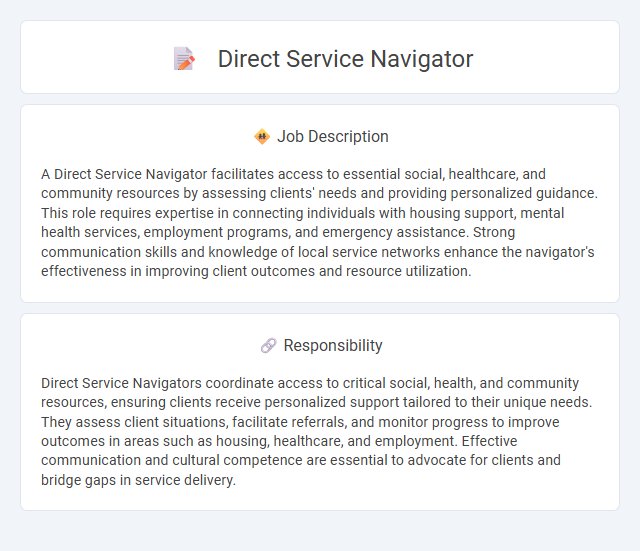
A Direct Service Navigator facilitates access to essential social, healthcare, and community resources by assessing clients' needs and providing personalized guidance. This role requires expertise in connecting individuals with housing support, mental health services, employment programs, and emergency assistance. Strong communication skills and knowledge of local service networks enhance the navigator's effectiveness in improving client outcomes and resource utilization.
Individuals experiencing challenges such as housing instability, substance use disorders, or mental health concerns may find the Direct Service Navigator role suitable due to its focus on connecting clients with essential resources and supports. Those with strong communication skills, empathy, and problem-solving abilities are likely to thrive in this position. However, people who prefer routine tasks or have difficulty managing high-pressure situations may find this role less compatible with their strengths.
Qualification
Direct Service Navigators typically require a bachelor's degree in social work, psychology, or a related human services field, combined with experience in case management or community outreach. Strong communication skills, cultural competency, and knowledge of social service programs are essential for effectively connecting clients to resources. Certifications such as Certified Social Worker (CSW) or relevant state licensure may enhance qualifications and job performance.
Responsibility
Direct Service Navigators coordinate access to critical social, health, and community resources, ensuring clients receive personalized support tailored to their unique needs. They assess client situations, facilitate referrals, and monitor progress to improve outcomes in areas such as housing, healthcare, and employment. Effective communication and cultural competence are essential to advocate for clients and bridge gaps in service delivery.
Benefit
The Direct Service Navigator role likely offers significant benefits such as personalized client support and streamlined access to essential resources, potentially improving client outcomes. Individuals in this position probably experience professional growth through direct interactions with diverse populations and collaboration with multidisciplinary teams. The job may provide a fulfilling career path with meaningful impact on community well-being and social services.
Challenge
The Direct Service Navigator role likely presents challenges in managing complex client needs while coordinating resources efficiently. Navigators may face difficulties balancing urgent service demands with limited support systems. Success probably depends on adaptability and problem-solving skills in dynamic environments.
Career Advancement
Direct Service Navigators play a crucial role in connecting clients with essential resources, fostering community engagement, and enhancing client outcomes. Mastery of case management, strong communication skills, and in-depth knowledge of social services pave the way for career advancement into supervisory or program management positions. Continued education and certification in social work or human services significantly boost opportunities for leadership roles within nonprofit or governmental organizations.
 kuljobs.com
kuljobs.com